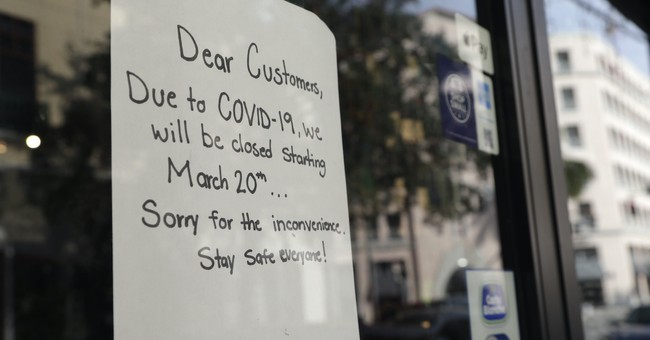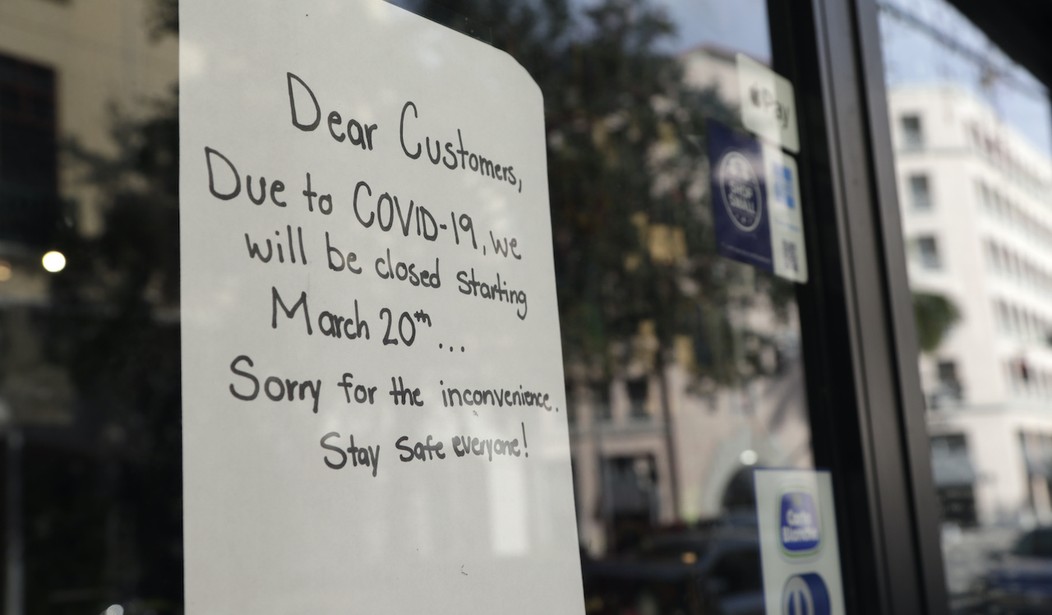
In times of crisis, people have a tendency to do one of two things.
Some fixate on worst-case scenarios and act out of fear. They may abandon logic, selectively choosing which stats and figures their reactions are based on through the sole filter of their emotions. They only see one course of action, one viable reaction, or one mode of thinking – nothing more.
Others get a clearer sense of who they are, where they come from, what their history is, and how they can avoid the worst of a situation, then overcome it.
For weeks, too many Americans have acted out of fear. Now that we are slowly re-opening America, it’s time for us to change course.
We have seen what over-arching, non-transparent, and single-tracked subjective decision-making has done to harm both the thousands that contracted COVID-19 as well as the millions of COVID-19 victims that were blessed to not contract the illness yet suffer its wrath in other ways. For weeks, the discussion around re-opening local economies around the nation had become too un-American. It’s time for a way more consistent with the spirit and successes of America. We must think bigger.
It’s the old question: fight or flight? Granted, we must fight smartly, confidently, yet differently. Still, it’s time to fight back against all impacts of this virus. Suggesting anything else casts aside an important trait throughout American history: our resourcefulness while overcoming.
From an economic standpoint, many have made the case for re-opening America for a variety of reasons, including:
- More than 36 million have filed first-time unemployment claims since March
- Roughly 40% of those making under $40,000 annually reported a major work disruption in March
- States including Pennsylvania have been unable to process all of the unemployment claims, leading to thousands going without benefits
- Threats to America’s supply chain leading to everything from shortages on the shelves to spikes in costs at the register
As well, the curve has flattened, so hospitals are not overrun at this point. In fact, for several weeks, experts have shown that the worst-case scenarios given for fatalities linked to COVID-19 were over-estimated, with some calling for “…time to end the COVID-19 Hysteria…” Even many epidemiologists are critiquing how often the models for projections are inconsistent at best.
Now is time to re-open our society and bolster our consumer-driven economy, leaning on the time-tested ingenuity of the American people.
We have always accomplished many goals simultaneously with our collective talents, efforts, and desire to lead and succeed with compassion. We will do it again in the post-COVID-19 world. Personal responsibility, consumer-driven decision-making, and business innovation can keep us safe while getting people back to work.
Over the past 2 months, we have seen that “big box” stores such as Target, Publix, and Wal-Mart can remain open during some of the strictest shelter-in-place orders around the nation and keep their customers safe. Why can’t we also trust the small business owners that are often family-owned and locally-invested to do the same? After all, they are the type of business operators that can least afford to flub social distancing and safety guidelines at the risk of losing their hard-earned consumer base due to small margins of operating expenses, leaving very little room for error.
Apparently, we can count on distillers to step up and pivot their businesses when Americans were in short supply of hand sanitizers. Why can’t we also expect them and other manufacturers to step up once again, revving up their economic engines while adjusting their business practices to keep their employees and customers safe?
Businesses exist to make profit and provide value, not just for their stakeholders, but for their consumers as well. That value includes providing proven quality in their products but also safe environments for commerce. It is inherent in basic free market exchanges: no one wants to die due to frequenting a business, working at a business, nor running a business.
Throughout American history, we have seen civic, medical, and economic conditions prompt business leaders to adjust. Innovation drives businesses to survive and society to thrive. For example, we have dealt with obesity and a weight-related epidemic in America for decades. This should have put soft drink companies and fast food restaurants out of business years ago, especially as some leaders attempted to calorie-shame and sin-tax consumers into submission. Yet, McDonald’s and Coca-Cola were innovative with their products (or created new ones) to remain global brand leaders. The Tylenol tampering cases of the early 1980s could have forever changed the way America deals with a headache, but it didn’t because of the way businesses (not just drug manufacturers) adjusted to the sudden and drastic change in the marketplace. For years, seat belts were accessories that were often overlooked, even as Americans drove their muscle cars through the 1950s, ‘60s, and ‘70s. Despite the spectrum of seat belt laws across states to this day, car safety increased with the support of car manufacturers that installed automatic seat belts in some models, warning devices for seat belt non-usage in others, and eventually pioneered air bags in most car models.
Our post-curve-flattening world is very much the same. Yes: we must continue to address the health crisis before us, but we can’t overlook that our successful re-opening must be driven mostly by the power of free markets, not free-wheeling governors.
With more people making good, self-directed decisions to keep us all safe while getting our economy and society back on track, we can have more assurances that more people can overcome the medical, social, economic, and emotional impacts of COVID-19. There is so much to protect from the scourge of this virus, from our lungs to our food supply chain. With more people in the fight, there will become more ways for us to overcome the aftermath of the virus safely.














Join the conversation as a VIP Member